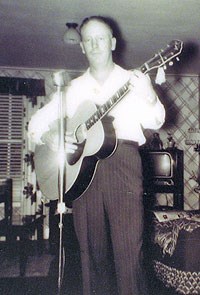
National Park Service Coal camp life could be isolating, even lonely at times. Entertainment for most camp folk was little. The church and school were the main sources of social events. There was "church meeting" several times a week. Sunday school and singing school to prepare the young for choir and hymn harmonies. Music and dancing was not commonplace in an area most visitors today might associate with lively instruments and mountain rhythms. A few people mentioned playing harmonica, or "mouth harp" or guitar. Henley Waters, who lived outside the camp but worked mainly at the tipple, played instruments, and Betty Lou Davis West passed the time playing her guitar on the front porch. Even the Blue Heron Quartet, which sang on Somerset radio, sang exclusively gospel music. Dancing, for almost all Blue Heron people, was a rare experience and was often forbidden as unacceptable behavior. Some young girls would learn to dance from their elders or from music on the radio, but their fathers seldom approved of learning to dance at all. Visiting was the main amusement for women at most coal camps, but at Blue Heron, several people mentioned that the wives kept more to themselves at this camp than at Co-operative or Worley camps. Most people from Blue Heron still remember the first movie they ever saw, the first time they went to town, or their first ice cream cone. Some older folks remember the first automobile they ever saw, and what a special event going to Stearns would be. There was a vast difference between the memories or those who first settled in Blue Heron and the younger generation who lived there after the road was in and television was available.
To continue your visit through the Blue Heron Mining Community, choose the next "ghost structure" you wish to visit.
|
Last updated: April 14, 2015
